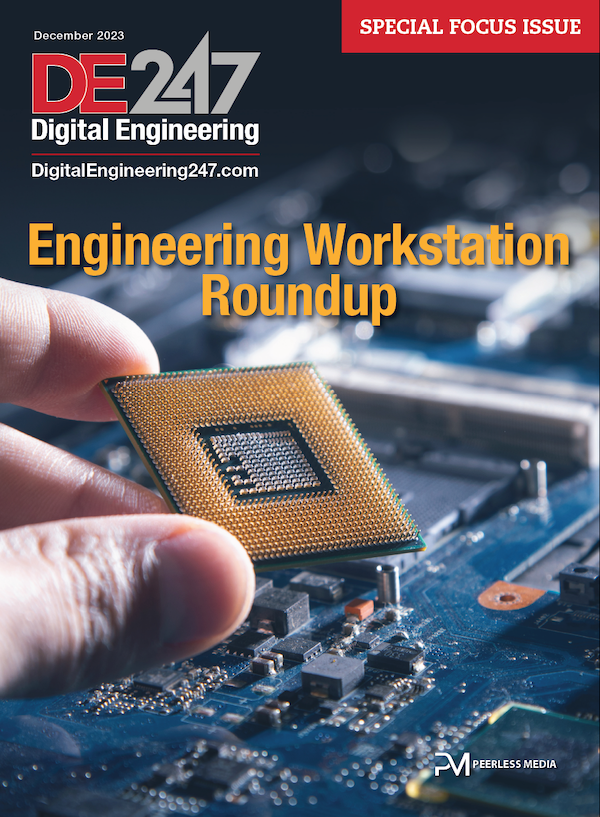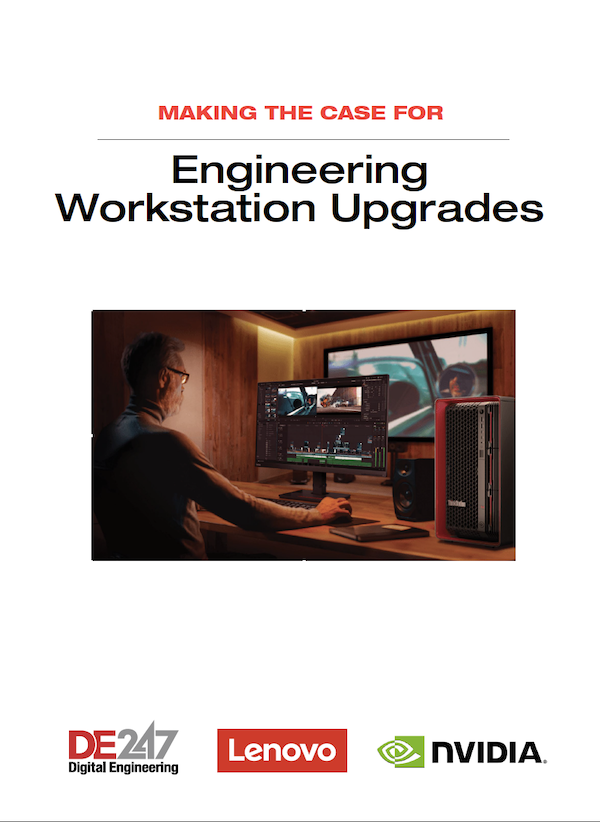Solid Power With Dell Precision 3240 Compact
Dell introduces an ultra-small form factor compact workstation.
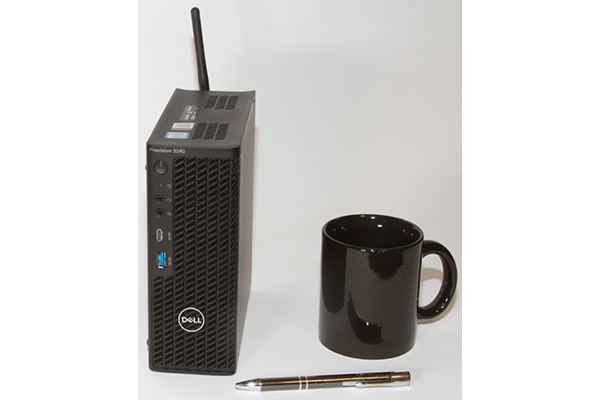
Fig. 1: The new Dell Precision 3240 Compact workstation packs plenty of power into an ultra-small form factor case. Images courtesy of David Cohn.
Latest News
April 30, 2021
Ultra-small form factor workstations make sense in places where desk space is at a premium. These tiny systems—similar in size to a thin client—can even be mounted to the back of an LCD monitor. We have reviewed several of these miniature systems before (including the HP Z2 and the Lenovo ThinkStation P320 Tiny).
Dell recently introduced its own ultra-small form factor workstation, the Dell Precision 3240 Compact, and sent us one to evaluate.
Housed in a charcoal gray aluminum case that measures 7.40x7.76x2.76-in. (HxDxW), the Dell Precision 3240 Compact looks like a miniature version of a Dell Precision tower workstation. The system we received weighed 4.22 lbs., plus an additional 2 lbs. for the 7.81x3.87x1.06-in. 240-watt power supply.
Despite its diminutive size, however, the Precision 3240 Compact proved to be a real workstation, powered by the latest generation Intel processor, a discrete NVIDIA graphics processing unit (GPU), up to 64GB of memory and lots of internal storage.
The case’s front consists of a stylish, perforated screen with a small panel hosting a round power button, hard drive indicator light, a pair of audio jacks, a USB 3.2 Gen 2 Type-C port and a USB 3.2 Gen 2 Type-A port with PowerShare.
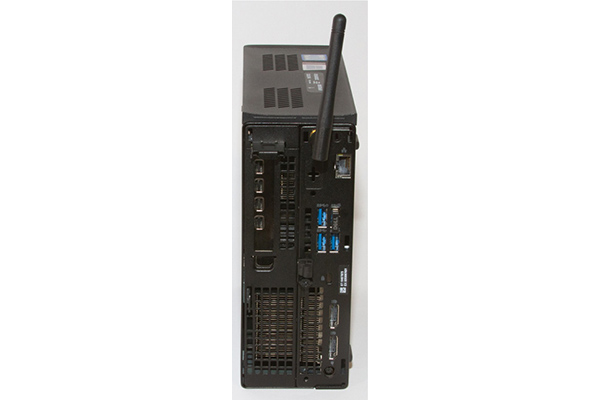
All other connections are on the rear panel and include a RJ-45 jack for the built-in network, four additional USB 3.2 Type-A ports (including one with SmartPower-On) and two DisplayPorts for the integrated Intel graphics, as well as a Kensington wedge lock slot and a port for the external power supply.
The system we received also came with an optional Wi-Fi card with a whip antenna that screwed onto a connector on the rear panel, and an NVIDIA Quadro RTX 3000 GPU with its own four miniDisplayPorts. Video Electronics Standards Association (VESA) mounting holes enable you to mount the system under a desk or to a monitor support and use an optional VESA mounting sleeve.
Compact Interior
Gaining interior access is not immediately obvious. But after removing the top panel and loosening a single captive screw, the side cover slides off to reveal a compact, well-organized interior. A plastic cover housing a 2.5-in. cooling fan covers the CPU. Removing this reveals the CPU beneath a heat sink, as well as a pair of small outline dual in-line memory module sockets.

A riser card provides support for a discrete graphics card via a half-height Gen 3 PCIe x8 slot. Beneath this are a pair of M.2 sockets for solid-state drives (SSDs). Depending on the options selected, Precision 3240 Compact systems also can be equipped with an optional I/O card, a standard 2.5-in. drive (HD) and a wireless local area network card.
Prices for the Dell Precision 3240 Compact start at $839 for a system based on a 3.7GHz Intel Core i3-10100 quad-core CPU, integrated Intel graphics, 8GB of single-channel DDR4 RAM, a 256GB PCIe NVMe Class 40 M.2 SSD, integrated network, a USB mouse and USB keyboard, a 180-watt external power supply and a copy of Windows 10 Pro, all covered by a three-year warranty. But that is just the starting point.
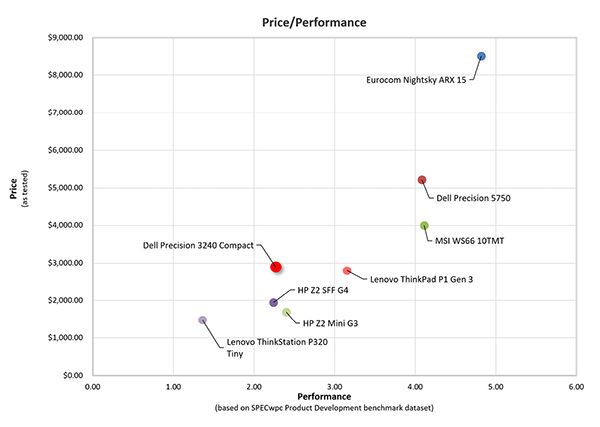
Dell offers a choice of eight different 10th-generation Intel processors, including five Core processors up to the 10-core i9-10900, as well as three Intel Xeon CPUs. Our evaluation unit came with a 10-core Intel Xeon W-1290 processor, which added $409 to the base price.
This 3.2GHz Comet Lake CPU has a 5.2GHz maximum turbo speed and includes 20MB SmartCache and Intel ultra-high definition (UHD) Graphics P30, with a thermal design power (TDP) rating of 80 watts. Any of the CPUs with more than four cores requires an operating system upgrade to Windows 10 Pro for Workstations, however, adding $148.
Although our Xeon-equipped system could support error-correcting code (ECC) memory, our evaluation unit included 32GB of non-ECC memory, installed using a pair of 16GB 2933MHz memory modules. These added $148. The same amount of ECC memory would have added $246.
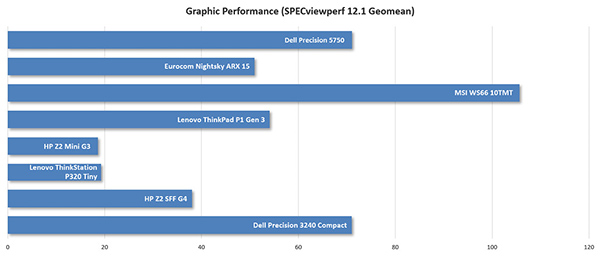
In addition to the integrated Intel graphics present in all eight available CPUs, Dell also offers a choice of NVIDIA discrete graphics cards, including the Quadro P400, P620 and P1000. Our Dell Precision 3240 Compact included an NVIDIA Quadro RTX 3000, with 6GB of dedicated GDDR6 memory.
This virtual reality-ready GPU has 1920 compute unified device architecture cores, 30 ray tracing cores and 240 Tensor cores. Its 192-bit interface results in a maximum bandwidth of 336 GB/second while drawing 80 watts.
The system we received also came with a 1TB PCIe non-volatile memory express Class 40 M.2 SSD, which added another $148. Dell offers SSDs ranging from 256 GB to 2 TB, as well as SATA hard drives from 500GB to 2TB. Precision 3240 Compact systems can accommodate up to two M.2 drives as well as a 2.5-in. hard drive, but systems equipped with a discrete GPU cannot also include a 2.5-in. drive; you must choose one or the other.
A wired Ethernet port comes standard, and our evaluation unit also included an Intel Wi-Fi adapter with an external whip antenna, a $22 option, enabling us to access our local area network wirelessly. Other options include an additional USB Type-C port, a VGA port, an HDMI port or a serial port, which can be added to systems equipped with an NVIDIA GPU. There is also an optional PCIe I/O card that includes Thunderbolt 3 ($81), but this can only be included on systems lacking discrete graphics.
Very Good Performance
Although the Dell Precision 3240 Compact workstation performed well on most of our benchmarks, as we have seen with other ultra-small form factor workstations, its results were more comparable to modern mobile workstations than desktop systems.

On the SPECviewperf tests, the Dell system easily outperformed the HP Z2 Mini and Lenovo ThinkStation P320 Tiny systems, thanks to its NVIDIA RTX graphics. On the SPEC SolidWorks benchmark, the Dell system lagged behind the HP Z2 on eight of the 11 datasets while surpassing it on three.
On our AutoCAD rendering test, which shows the advantage of fast CPUs with multiple cores, the Dell Precision 3240 Compact curiously lagged well behind every system but the Lenovo ThinkStation P320 Tiny. It completed the rendering in an average of 70.4 seconds, one of the slowest results we have recently recorded.
We also ran the very demanding SPECwpc workstation performance benchmark, and the Dell Precision 3240 Compact delivered excellent results on this test. Unfortunately, the newer version of this test was not released yet when we tested the HP and Lenovo ultra-compacts, so we have no results to compare against the Dell test.
The 3240 Compact did very well compared to those older systems on the previous version of this benchmark. The Dell Precision 3240 Compact remained cool and quiet throughout our tests.
Dell rounds out the Precision 3240 Compact with a USB keyboard and mouse, but our system included a very nice Dell wireless keyboard and mouse, which added $26. The more powerful options in our evaluation unit also required an upgrade to a 240-watt power supply and heavier power cord, adding $36 more. The system we received also came with a rear cable cover, which added another $20. All in all, our Dell Precision 3240 Compact priced out at $2,893.
Dell preloaded Windows 10. Ubuntu Linux and Red Hat Enterprise Linux are also available. The workstation is independent software vendor certified (ISV) for use with software from companies including Autodesk, Dassault Systèmes, PTC and Siemens and is backed by a three-year basic on-site warranty.
Other warranty options of up to five years as well as ProSupport with next-business-day on-site service are also available.
The new Dell Precision 3240 Compact is an excellent ISV-certified ultra-small form factor workstation. It delivers very good performance at a price that, although a bit more than other tiny workstations we have recently tested, is in line with what is packed inside its tiny case. If space is at a premium, the Dell Precision 3240 Compact is an excellent choice.
More Dell Coverage

Subscribe to our FREE magazine, FREE email newsletters or both!
Latest News
About the Author
David Cohn is a consultant and technical writer based in Bellingham, WA, and has been benchmarking PCs since 1984. He is a Contributing Editor to Digital Engineering, the former senior content manager at 4D Technologies, and the author of more than a dozen books. Email at [email protected] or visit his website at www.dscohn.com.
Follow DE




